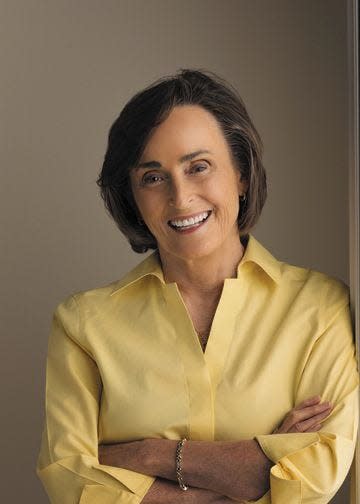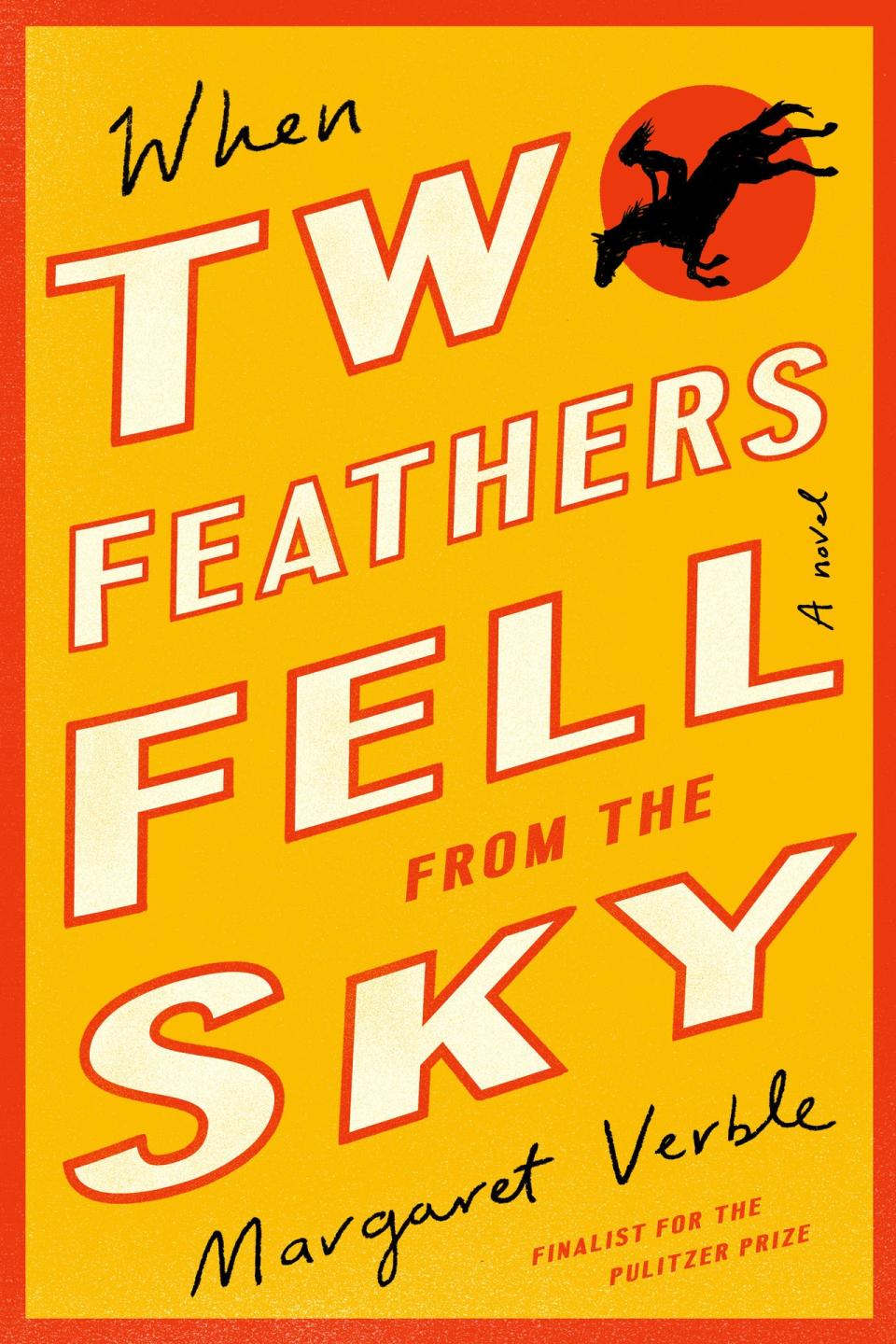One Read author Margaret Verble talks 'Two Feathers,' Nashville history and keeping her pen light

Beginning any story means arriving in its middle.
Margaret Verble knows this as well as any novelist. But the reality became more acute as she set in motion "When Two Feathers Fell From the Sky," her 2021 book and this year's Daniel Boone Regional Library One Read.
Foregrounding the supernatural while keenly studying human nature, Verble set her story on and around the grounds of Glendale Park Zoo in 1920s Nashville. The book's opening statement, "When it Was," lyrically and clearly expresses how every moment is made up of countless moments leading there and then.
Verble tells us what Two Feathers' story follows in a series of "afters." Among the most resonant:
"It was long after the buffalo thundered toward a great salt lick in lines, bellowing, snorting, and flicking flies."
"... After the Cherokee, Chickasaw, Shawnee, and Muscogee agreed to share the forest, the creeks, and the salt lick."
After white people pilfered this common land. After Tennessee statehood; after the Civil War and an uneasy peace; after a fraught Reconstruction; after "Nashville Railway and Light ran electric lines out to Glendale"; after the park zoo and its amusements fostered new pockets of culture and new cohorts, human and otherwise mammalian.
"Specifically, it was the summer of 1926," Verble writes.
To unearth that specific historical moment, Verble looked around at the gathered moments of her own life. She wrote "When Two Feathers Fell From the Sky" after growing up within the shadows of the former Glendale grounds; after carrying her Cherokee heritage through predominantly white spaces; after her first novel, "Maud's Line," was named a Pulitzer Prize finalist; and after further internalizing Nashville's history, thus expanding the horizon lines of her own imagination.
After all these moments, and after nearly a month of One Read programs unspooling the book's themes and details, Verble will give an author talk in Columbia next week.
Grounded in personal history
The character who embodies Verble's title is a Cherokee horse diver cheering Nashville crowds at a time when such forms of entertainment faced an unsteady future. A devastating accident on the job both continues and radically changes elements of Two Feathers' life.
She clings to and furthers certain friendships — with Crawford, a Black Glendale employee, with fellow performers, even with the zoo's animals. Two's longing for her Oklahoma home intensifies. The dangers around her shift shape. And her world becomes a more spiritually sensitive one, touched by the presence of Little Elk, a dearly departed figure who becomes a sort of ghostly, priestly overseer for Two.
Two Feathers is a fully-realized main character: fierce yet as dependent as anyone, quick-witted and deeply grieved, loyal and filled up with longing. But the book bears a great cast, and Verble hopes readers will see themselves somewhere on these pages, in someone.

"Since it’s come out, I have discovered that not everybody identifies most closely with Two Feathers, the title character," she said in conversation with the Tribune this summer. "People make different choices about that — some of those have been surprising to me, but I’m very happy about it."
Perhaps most delightfully surprising, she said, are the readers who tether themselves to Little Elk and his new ancient way of moving through the world.
Verble's personal history casts its own thoughtful shadow, becoming a character with traits and memories readers might cling to. Now based in Kentucky, Verble came of age in the Nashville neighborhood once housing Glendale Park Zoo, which closed during the Great Depression.
The younger Verble noticed physical remnants of Glendale, and let her mind's eye fill in the details.
"I can’t really remember not knowing that zoo had been there," she said.
Forever interested in stamping Nashville history on the page, Verble approached the book with care and intention, holing up in the newspaper archives of the Tennessean, tracing and retracing physical loops around her former neighborhood.
As a girl, she looked at the land and exercised her imagination in a certain way. Decades later, recapturing the plot required even greater imagination, she said, "because the things that were there when I was younger are no longer there."
Verble also carried a multi-faceted view of race and racism into her writing. Spending time in Oklahoma as a girl, she felt the strength of her family's Cherokee bond. Back in Nashville, she was assigned both an insider's and outsider's view of race; functionally viewed as white by her peers, she intuitively recoiled at the way Black citizens were treated, she said.
Complicated — and distinct — forms of racism attach to the book. This is perhaps most evidently seen in a moment when a white boardinghouse neighbor speaks ill of Crawford in Two Feathers' presence; this woman does not see Two as an equal yet somehow feels comfortable mocking her Black friend. Two Feathers hoists one of her crutches, and quickly puts the young woman in her deserved place.
Spirits in the material world
Like her main character astride a horse, Verble brings deft balance to "When Two Feathers Fell From the Sky." The book is charged with very serious themes, yet maintains a light touch.
"One of the mistakes that we make is trying to preach to people," Verble said. "A lot more people are won over by having a pleasant time than they are by being lectured."
And the book needed to find its buoyant side, she added. Set as it is in a sort of provincial, prefigured Disneyland, an overly dour approach to the story would make little tonal sense.
And the balance between the material and spiritual felt like no balancing act at all, Verble said. Her imagination integrates those worlds every waking moment.
"That’s the way I see the world. So it’s not like I had to conjure all of that ... I guess they call it ‘magical realism’ — it just seems like normal to me," she said.
Cautious with her promises this summer, Verble said she was in the process of crafting fresh stories for characters from "Two Feathers." Readers often approach her with hopes of seeing certain characters return. That design allows readers and characters to grow together, and an author to explore themes swelling within them through trusted eyes.
After "When Two Feathers Fell From the Sky," the future is unwritten but full of promise.
Verble will speak at 7 p.m. Thursday at Launer Auditorium on the Columbia College campus. The talk will be livestreamed at the Callaway County Public Library in Fulton and via KOPN at 89.5 FM. Visit https://www.dbrl.org/one-read for more information.
Aarik Danielsen is the features and culture editor for the Tribune. Contact him at adanielsen@columbiatribune.com or by calling 573-815-1731. He's on Twitter @aarikdanielsen.
This article originally appeared on Columbia Daily Tribune: How Margaret Verble filled this year's DBRL One Read with history, promise

